Why We Preach The Grace: The Curse Of The Law
Apostle Grace Lubega
Christ hath redeemed us from the curse of the law, being made a curse for us: for it is written, Cursed is everyone that hangeth on a tree (Galatians 3:13)
 The only curse spoken of in the New Testament is the curse of the law. God has never determined to curse His children because the Bible says that He cannot curse whom He has blessed.(Numbers 23:8,20)
The only curse spoken of in the New Testament is the curse of the law. God has never determined to curse His children because the Bible says that He cannot curse whom He has blessed.(Numbers 23:8,20)
Even in the account of the fall of man, He cursed the snake and the ground but did not use ‘curse’ with regard to Adam or Eve. (Genesis 3:14-17)
So where did the curse of the law start from? In the book of Deuteronomy, Moses gives a list of curses that were to befall the children of Israel if they broke the law. He said: ‘cursed shall thou be in the city and cursed shall thou be in the field…Cursed shall be thy basket and thy store…Cursed shalt thou be when thou comest in and cursed shall thou be when thou goest out…’ (Deuteronomy 28).
He goes on and on turning every blessing into a curse in the event of disobedience of God’s commandments.
To redeem us from these curses, Jesus identified which one of all the curses Moses had listed he could personify and chose that of hanging on a tree. The scriptures say that cursed is he who hangs on a tree (Deuteronomy 21:23).
By implication, He became ‘a’ curse and destroyed ‘the’ curse. As a new creature in Christ, you are no longer subject to any curses. God declared a permanent blessing over your life; and, bound Himself to it by an oath and swearing by His name because there was no one greater to swear by. (Hebrews 6:13-17). Hallelujah!
FURTHER STUDY: Proverbs 10:22, Galatians 3:10
GOLDEN NUGGET:
As a new creature in Christ, you are no longer subject to any curses. God declared a permanent blessing over your life; and, bound Himself to it by an oath and swearing by His name because there was no one greater to swear by.
PRAYER: Thank you Lord for this great word. I am free from the curse of the law. I walk under the liberty of your grace. I am perpetually blessed. I have a life sentence of prosperity; a life sentence of divine health; a life sentence of favour; a life sentence of wisdom; a life sentence of mercy; a life sentence of greatness. In Jesus’ name. Amen.
[/restab] [restab title=”Kinyarwanda”]Apostle Grace Lubega
KUKI TUBWIRIZA UBUNTU: UMUVUMO W’AMATEGEKO
Kristo yaducunguriye kugira ngo dukizwe umuvumo w’amategeko, ahindutse ikivume ku bwacu (kuko byanditswe ngo”Havumwe umuntu wese umanitswe ku giti”), (Abagaratiya 3:13)
Umuvumo wonyine uvugwa mu isezerano rishya ni umuvumo w’itegeko. Imana ntiyigeze igambirira kuvuma abana bayo kuko bibiliya ivuga ko itavuma uwo yahaye umugisha.(Kubara 23:8,20)
Ni gihe umuntu yacumuye, yavumye inzoka n’ubutaka ariko ntiyavumye ‘Adam na Eva’.(Itangiriro 3:14-17)
Ubwo se umuvumo w’itegeko wahereye hehe? Mu gitabo cyo gutegeka kwa kabiri, Mose atanga uruhererekane rw’imivumo yari kuzagera ku bana ba isirayeri nibica amategeko. Yagize ati: ‘Uzagirira umuvumo mu mudugudu, uzawugirira no mu mirima. ..azavuma icyibo yawe nububiko bwawe…. azavuma amajya namaza. (Gutegeka kwa kabiri 28)
Yakomeje ahindura buri mugisha umuvumo mugihe udakurikije amategeko y’Imana.
Kugirango Yesu adukize iyi mivumo, yagombye kureba umwe muri yo yakwikorera ahitamo uwo kumanikwa ku giti. Icyanditswe kiravuga ngo havumwe umanitswe ku giti (Gutegeka kwa kabiri 21:23)
Yabaye ‘i’ kivume maze akuraho ‘u’ muvumo. Nk’icyaremwe gishya muri Kristo, nta mivumo ugifite. Imana yahaye ubuzima bwawe umugisha uhoraho; kandi yabishizeho indahiro no kurahira kubw’izina rye kuko ntawundi ukomeye wari kwirahira.(Abaheburayo 6:13-17). Hallelujah!!
IBINDI BYANDITSWE: Imigani 10:22, Abagalatiya 3:10
ICYO WAKURAMO: Nk’icyaremwe gishya muri Kristo, nta mivumo ugifite. Imana yahaye ubuzima bwawe umugisha uhoraho; kandi yabishizeho indahiro no kurahira kubw’izina rye kuko ntawundi ukomeye wari kwirahira
ISENGESHO: Urakoze mwami ku bw’iri jambo rikomeye. Nta muvumo w’amategeko undiho. Ngendera mu kubohorwa kubw’ubuntu bwawe. Mpawe umugisha. Mfite ubuzima bwiza; ubuzima butarwara,;ubuzima bw’imbabazi,ubuzima bw’ubwenge,ubuzima bw’impuhwe; ubuzima bukomeye. Mu izina rya Yesu. Amen
[/restab]
[restab title=”French”]
Apôtre Grace Lubega
POURQUOI NOUS PRECHONS LA GRACE : LA MALEDICTION DE LA LOI
Christ nous a rachetés de la malédiction de la loi, étant devenu malédiction pour nous-car il est écrit: Maudit est quiconque est pendu au bois (Galatiens 3:13)
La seule malédiction mentionnée dans le Nouveau Testament est la malédiction de la loi. Dieu n’a jamais décidé de maudire Ses enfants parce que la Bible dit qu’il ne peut pas maudire à qui Il a béni. (Nombres 23:8,20)
Même dans le récit de la chute de l’homme, il a maudit le serpent et le sol mais n’a pas utilisé la « malédiction » à l’égard d’Adam ou Eve. (Genèse 3:14-17)
Alors d’où vient la malédiction de la loi ? Dans le livre du Deutéronome, Moïse donne une liste de malédictions devant les enfants d’Israël s’ils ont enfreint la loi. Il a dit : « Maudit que tu sois dans la ville et maudit que tu sois sur le champ … Maudit sera ta corbeille et ton magasin … Maudit tu seras quand tu viendras et maudit tu seras quand tu vas sortir … » (Deutéronome 28)
Il poursuit et transforme toutes les bénédictions en malédiction en cas de désobéissance aux commandements de Dieu.
Pour nous racheter de ces malédictions, Jésus a identifié l’une de toutes les malédictions que Moïse avait listées qu’il pouvait personnifier et choisir celui de s’accrocher à un arbre. Les écritures disent que maudit est celui qui accroche un arbre (Deutéronome 21:23).
Par implication, il est devenu « une » malédiction et détruit « la » malédiction. En tant que nouvelle créature en Christ, vous n’êtes plus soumis à des malédictions. Dieu a déclaré une bénédiction permanente sur votre vie ; et s’est lié à Lui-même par un serment et en jurant par son nom parce qu’il n’y avait personne de plus à jurer. (Hébreux 6: 13-17). Alléluia !
ETUDE COMPLEMENTAIRE : Proverbes 10:22, Galatiens 3:10
PEPITE D’OR : En tant que nouvelle créature en Christ, vous n’êtes plus soumis à des malédictions. Dieu a déclaré une bénédiction permanente sur votre vie ; et s’est lié à Lui-même par un serment et en jurant par son nom parce qu’il n’y avait personne de plus à jurer.
PRIERE : Merci Seigneur pour cette grande parole. Je suis libre de la malédiction de la loi. Je me promène sous la liberté de votre grâce. Je suis perpétuellement béni. J’ai une condamnation à perpétuité de prospérité ; une condamnation à perpétuité de la santé divine ; une condamnation à perpétuité de faveur ; une condamnation à perpétuité de la sagesse ; une condamnation à perpétuité de la miséricorde ; une condamnation à vie de grandeur. Au nom de Jésus. Amen.
[/restab]
[restab title=”Runyankore”]
Entumwa Grace Lubega
AHABWENKI TURIKUBURIRA EMBABAZI: OMUKYEENO GW’EBIRAGIRO
Kristo akatucungura omu mukyeeno gw’Ebiragiro, obu yaakyeenwa ahabwaitu, ahakuba kikahandiikwa ngu: Omuntu weena orikuhanikwa aha muti akyeenwe: (Abagalatia 3:13)
Omukyeeno gwonka ogurikugambwa omu ndagaano ensya n’omukyeeno gw’ebiragiro. Ruhanga takasharahoga kukyeena abaana be ahabw’okuba Baiburi negira eti nkaakyeena nta abu Ruhanga atakyeenire? (Okubara 23:8,20)
N’omukugwa kwa Adamu, akakyeena enjoka n’eitaka kwonka tarakozeise ekigambo ekyo ahari Adamu nari Haawa.(Okutandika 3:14-17)
Mbwenu shi omukyeeno gw’ebiragiro gukatandikirahi? Omu kitabo ky’Ebiragiro, Musa akaheereza ebihandiko byemikyeeno ebyabaire biri eby’okuhika aha baana ba Israeli kuri bajemeire ebiragiro. Akagira ati: Omukyeeno gube aha kitenga kyawe n’aha nyungu yaawe egoya. Oryaba okyeenirwe omu magyenda n’omu magaruka…’ (Eky’Ebiragiro 28)
Agumizamu ahindura omugisha agukora omukyeeno wajeemera ebiragiro bya Ruhanga.
Okutujuna emikyeeno egi, Yesu akamanya ngu nimukyeeno ki ogu Musa yabaire ahandikire, akatorana ogwo ogwabaire guhanikire aha muti. Ebyahandiikirwe nibigira biti omuntu weena orikuhanikwa aha muti akyeenwe. (Eky’Ebiragiro 21:23).
Eki nikimanyisa ngu akaba omukyeeno yashazamu omukyeeno. Nk’omuntu musya omuri Kristo, noba otakiine emikyeeno yona. Ruhanga akaragiira omugisha ogutahwaho aha magara gawe.; kandi, yarahira omwiziina rye ahabw’okuba hakaba hatariho eiziina ahaiguru ye ry’okurahiza. (Abahebuurayo 6:13-17). Hallelujah!
SHOMA NEEBI: Enfumu 10:22, Abagalatia 3:10
EKY’OKUHAMIZA KIMWE: Nk’omuntu musya omuri Kristo, noba otakiine emikyeeno yona. Ruhanga akaragiira omugisha ogutahwaho aha magara gawe.; kandi, yarahira omwiziina rye ahabw’okuba hakaba hatariho eiziina ahaiguru ye ry’okurahiza.
OKUSHABA: Mukama ninkusiima ahabw’ekigambo kikuru eki. Tinyine omukyeeno gw’ebiragiro. Ningyendera omu busingye bw’embabazi zawe. Ninyeyongyera kugira omugisha. Ndigye omuri byona; nyine amagara marungi, obuganzi; obwengye; embabazi; obukuru. Omwiziina rya Yesu. Amiina.
[/restab]
[/restabs]
Posted in: Phaneroo Devotion
Leave a Comment (0) →



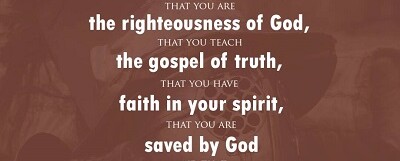
 Before I learnt this truth, I used to prepare for ‘warfare’ by ‘wearing the armour.’ I would say to myself: ‘I now wear the helmet of salvation, the belt of truth, the breastplate of righteousness, the shield of faith and the sword of the spirit.’
Before I learnt this truth, I used to prepare for ‘warfare’ by ‘wearing the armour.’ I would say to myself: ‘I now wear the helmet of salvation, the belt of truth, the breastplate of righteousness, the shield of faith and the sword of the spirit.’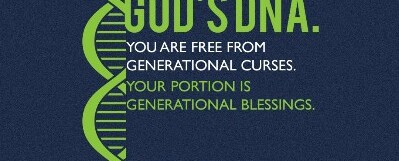
 The new creature in Christ is not subject to any generational curses. Like our theme scripture shows: the notion that one is bound because of his father, grandmother or great grandfather’s action is scripturally inaccurate.
The new creature in Christ is not subject to any generational curses. Like our theme scripture shows: the notion that one is bound because of his father, grandmother or great grandfather’s action is scripturally inaccurate. 
 Repentance is not about telling God how sorry you are for something you have or might have done. The Greek word metanoeo for repent means changing one’s mind.
Repentance is not about telling God how sorry you are for something you have or might have done. The Greek word metanoeo for repent means changing one’s mind.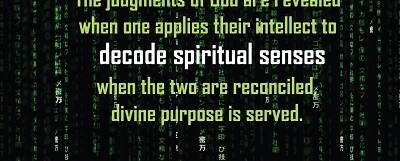
 The Bible says that now that we live in the spirit, walk also in the spirit. Functioning in the world of spirits requires an activation of all our spiritual senses. That is the place God has called us to.
The Bible says that now that we live in the spirit, walk also in the spirit. Functioning in the world of spirits requires an activation of all our spiritual senses. That is the place God has called us to. Worship is not about voices; it is about sound in the spirit. That is what makes the distinction between a singer and a worshipper. Your sound in the spirit is what distinguishes you.
Worship is not about voices; it is about sound in the spirit. That is what makes the distinction between a singer and a worshipper. Your sound in the spirit is what distinguishes you.
 The oneness of flesh that follows a man leaving his father and mother to join his wife appoints a kind of ‘nakedness’. It means that you do not get into marriage with your guard up and with walls several storeys high around your heart.
The oneness of flesh that follows a man leaving his father and mother to join his wife appoints a kind of ‘nakedness’. It means that you do not get into marriage with your guard up and with walls several storeys high around your heart.
 Rachel had good reason to resent and dislike her sister. After all, she was meant to be Jacob’s only wife but her sister was forced into the picture.
Rachel had good reason to resent and dislike her sister. After all, she was meant to be Jacob’s only wife but her sister was forced into the picture.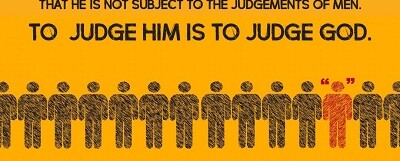
 Revelation 7:1-8 gives an account of the sealing of the children of Israel. These are named as Judah, Reuben, Gad, Aser, Nephtalim, Manasseh, Simeon, Levi, Issachar, Zabulon, Joseph and Benjamin. However, when you study Genesis, you realize that Manasseh was a grandson of Israel and not necessarily a son.
Revelation 7:1-8 gives an account of the sealing of the children of Israel. These are named as Judah, Reuben, Gad, Aser, Nephtalim, Manasseh, Simeon, Levi, Issachar, Zabulon, Joseph and Benjamin. However, when you study Genesis, you realize that Manasseh was a grandson of Israel and not necessarily a son. 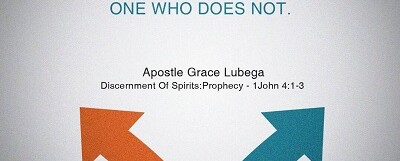
 Firstly note that not everything preached on the pulpits is the truth. And also, not every man who stands to speak in the name of God is sent of Him.
Firstly note that not everything preached on the pulpits is the truth. And also, not every man who stands to speak in the name of God is sent of Him.
 It is one thing to touch a generation, it is another to change it.
It is one thing to touch a generation, it is another to change it.